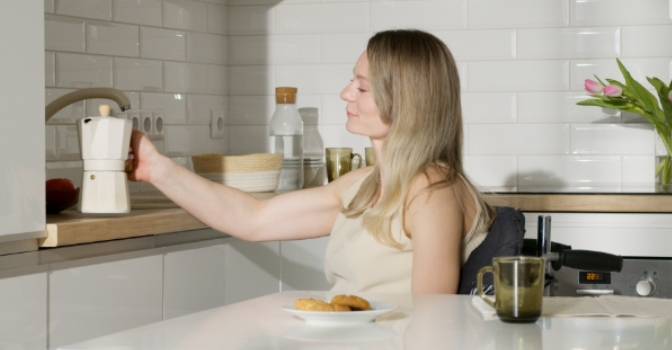Home modifications are custom changes made to a home to make it easier and safer for you to access and use.
NDIS home modifications can cover small or significant changes to the structure, layout or fittings of your home to meet your individual disability needs.
It’s a complicated area and there’s a lot to consider, so let’s dive into the detail.
How NDIS home modifications work.
Home modifications are one of the many supports the NDIS can fund to help a person with disability live safely and independently at home. They can also help to make daily tasks easier.
The NDIS can fund a range of home modifications, from installing grab rails to complex projects such as adding ramps or hoists.
Home modifications funding may be included in your NDIS Plan if you:
- Have safety concerns or difficulty moving around your home
- Need additional support with personal care, like showering
- Can’t access or use rooms you need to use in your home
- Have difficulty achieving your home-related goals because of your disability
- Need changes to your home so support workers can assist you safely.[1]
Home modifications are divided into two categories by the NDIS based on their cost and risk level: minor and complex.
Minor home modifications – less than $20,000.
Minor home modifications are lower-cost modifications that don’t require structural changes and only apply to one or two areas of your home.
They’re also low risk meaning there are fewer chances of issues once the work is complete.
There are two categories of minor home modifications:
- Category A: minor home modifications that cost under $10,000
- Category B: minor home modifications that cost between $10,000 and $20,000 or involve minor changes to a bathroom floor.
Examples include:
- Installation of grab rails and handrails
- Installation of handheld showers or accessible tapware
- Level shower access (depending on cost)
- Some ramps
- Widening doorways.
Complex home modifications (CHM).
Complex home modifications are usually custom structural changes that are higher risk. Often, they require building permits or approvals and may cover multiple areas of your home. Modifications that will take a long time may also be considered complex.
Examples include:
- Permanent ramps costing more than $10,000 that need building permit approval
- Structural modifications to a bathroom, including changes to the floor
- Extensive plumbing or electrical works
- Changes to load-bearing walls, such as removal
- Installation of elevators or lifts costing more than $10,000
- Works requiring engineering, surveying or building certification.[2]
If the NDIS funds CHM in your plan, they’ll usually also fund a building works project manager to help you understand your contract, communicate with the builder and ensure the project meets all legal requirements.
How to get home modifications in your NDIS Plan.
All home modifications require an assessment before funding can be included in your plan. If you think home modifications may help you to achieve your goals, talk to your planner, LAC or support coordinator first.
- For Category A minor home modifications, you’ll need to provide an assessment from an occupational therapist.
- For Category B minor home modifications and CHM, you’ll need to provide an assessment from a home modification assessor.
Recent changes to the NDIS mean funding for non-structural minor home modifications valued at less than $20,000 is now based on market rates in your area. That means you no longer need a quote unless you live in a remote or very remote area. Two itemised quotes are required for complex home modifications.
If you’re renting, you need to supply written approval from the homeowner and other relevant bodies along with the assessment. The NDIS will also want to know if your landlord requires the modifications to be removed when your lease ends.
If you have a mortgage, check if any modifications need to be approved by your mortgage provider. If you live in a building with shared ownership, you’ll need to supply written permission from the body corporate or other relevant bodies along with your assessment.
Once reviewed and approved, the NDIS will include funding for the work in your plan.
What does the NDIS consider when funding home modifications?
The NDIS will want to be sure that modifications are the best and most cost-effective way to achieve your goals and meet the reasonable and necessary requirements.
The NDIS may fund home modifications that:
- Are related to your disability
- Connect to your goals
- Help you take part in social and work life
- Are effective and beneficial for you
- Are legal and safe
- Should be funded by the NDIS
- Are value for money compared to other options.
The NDIS is more likely to fund home modifications if they’re for your primary residence and you intend to continue living there.
In some cases, the NDIS may fund assistive technology (such as a shower chair) or home and living supports instead.
What won’t the NDIS fund?
- Fixtures, fittings or materials above standard grade. However, you can pay for upgrades or more expensive finishes with your own money.
- Installation of swimming pools and spas, including hydrotherapy
- Repairs to pre-existing home damage outside of the area where modifications are required
- Making your house bigger
- Routine repairs and maintenance
- Insurance premiums
- Removal of modifications you no longer need (unless agreed to in writing before funding the original modifications)
- Repairing modifications that don’t comply with the national building codes and standards.
Originally published 17 March 2019, updated 28 December 2022.
[1] NDIS, Home modifications operational guideline, published 11 October 2022
[2] NDIS, Home modifications operational guideline, published 11 October 2022, p 11
Do you have Home Modifications in your budget?
If you answered ‘yes’ and you want to connect with an OT in your area, or if you have more questions, call us on 1300 05 78 78 – we can help.

